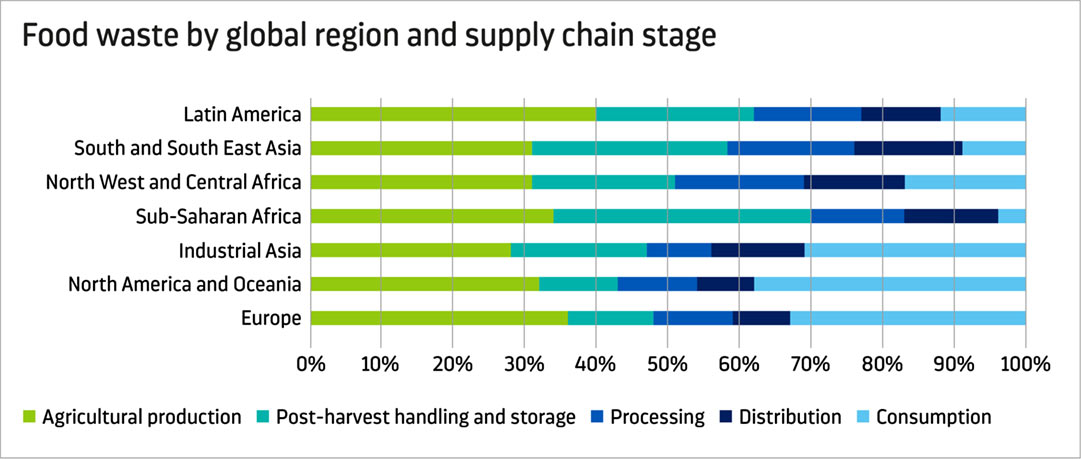

The cold chain is vital to our economy and society.
By transporting food, pharmaceuticals and other products safely from where they are grown or extracted, through the manufacturing process, into shops and restaurants and ultimately to the end consumer, the cold chain makes modern life possible.
How it works

Every product has a different journey through the supply chain.
Take for example a food product like a bag of frozen peas. It must be grown, processed, packaged, stored, transported and then sold. This supply chain may be the responsibility of one company, from end to end, or more likely it will involve several different companies.
Whether it’s one company or many they share the same fundamental challenge. They must make sure that at every stage of the chain the product is kept at an appropriate, safe, temperature.
Managing the cold chain is a very specific responsibility and requires specialist skills, knowledge, facilities, vehicles and technology.
Economic Impact
This cold chain industry has a multi-billion-pound impact on the UK on its own, but once you take in to account how vital it is to the agricultural, manufacturing and retailing industries it serves, it is possible to see just how important it is. For example, the UK frozen food industry is estimated to be worth in excess of £8billion (BFFF) and the chilled food industry in excess of £11 billion (CFA).
It is also a source of thousands of quality jobs from warehouse operatives and drivers; to systems analysts and robotics engineers. Cold chain businesses are constantly innovating, adapting to a changing food industry and evolving consumer demands. Dramatic changes in how people buy groceries and catered food mean that supply chains are becoming more complex.
Innovations in data management and technology developed within the cold chain are making these wider innovations possible.
Environmental Impact
Investing in a robust, resilient and flexible cold chain is one of the most important defences against climate change. Food waste is a global climate catastrophe. The global population wastes one third of the food it produces. The effect this has in wasted carbon emissions and unnecessary/inefficient land use makes food waste the third most important contributor to climate change after aviation and power generation.
In the developed world, we rightly focus on the wastefulness of our consumer habits. We throw away too much food from our homes, shops and restaurants. However, we must not lose sight of the fact that across the developing world the food waste problem is a result not of consumer wastefulness but the absence of a robust and efficient cold chain. For example, in South and South East Asia 51% of food waste occurs in post-harvest storage and distribution. Not that we should be complacent according to the same metrics 20% of food waste in Europe occurs in storage and distribution.

Food and Agriculture Organization of the United Nations. 2013b. Food wastage footprint. Impacts on natural resources. Summary Report. Rome, Italy http://www.fao.org/3/i3347e/i3347e.pdf
The first and most important contribution to tackling climate change of the UK cold chain is that fact that it exists. Maintaining and improving our robust, profitable and sustainable temperature-controlled logistics industry in the UK is the first and most important way to contribute to tackling climate change.
However, there are other ways in which the cold chain impacts on our environment. The cold chain requires the use of a significant amount of energy (mostly electricity). Certain (increasingly rare) refrigerant gases, if poorly managed and allowed to leak can have a significant global warming impact. And the transportation of goods on refrigerated vehicles from large heavy goods vehicles to small vans, still is predominantly powered by diesel engines.
The UK cold chain is leading the world in seeking to reduce the environmental impact of its operations. The Federation runs the industry climate change agreement, we are on course to meet and exceed our target for delivery a 12% increase in energy efficiency from cold storage facilities between 2008 and 2020.
We are also seeing innovation across the chain, from investments in new facilities and upgrades, changes in refrigeration systems (such as low charge ammonia), to new engineless fridges on vehicles, alternative fuels and super-efficient, clean diesel engines. Providing confidence to business to make the investments they need to make in accelerating these trends is one of the ways in which economic and environmental policy must work together.
Want to know more?
Here are some useful links to find out more about the importance and impact of the cold chain.
Food Industry
British Frozen Food Federation
Institute of Grocery Distribution
Food Waste
UK Waste Resources Action Programme
Climate Change & Food Systems: Assessing Impacts and Opportunities – Meriden Institute 2017
Food wastage footprint. Impacts on natural resources. Summary Report – Food and Agriculture Organization of the United Nations. 2013b.

